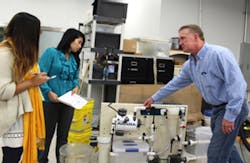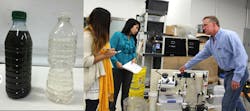New Technology For Cleaning Frac Water Gets Positive Marks in Water Quality Test
Coaxing natural gas out of shale rock takes water, a precious resource for Texas where droughts are frequent, and cities’ and businesses’ need for water seems ever increasing.
This makes recycling this type of water for reuse more important than ever, said Dr. Michael Wetz, associate professor of Life Sciences at Texas A&M-Corpus Christi and a water quality expert. This is the goal of one company receiving valuable research and business assistance from Texas A&M University-Corpus Christi.
“Our patented technologies greatly improve the methodology of removing contaminants from oil field wastewater, and compared with current methods, it is more cost effective and can be done onsite,” said Jeff Soward, president of ARANA Water Technologies.
In the latest round of tests with Wetz, ARANA collected frac water from the Eagle Ford field at Briscoe ranch to be analyzed.
READ ALSO: What LEED Did for Buildings, This Could Do for Shale Gas Production
“I watched Mr. Soward’s group inject raw frac water into the system, which processed the samples for 26 minutes,” said Wetz. “The total petroleum hydrocarbons were reduced by greater than 99 percent.”
Wetz said he also saw a reduction of other metals in the water, including arsenic, aluminum, iron, and selenium by as much as 90 percent.
The company’s connection to Texas A&M-Corpus Christi has propelled his company to success, Soward said.
“Having the research of a skilled and knowledgeable professor validating the results of our work is making a big difference in how ARANA's frac water recycling technologies performance has been viewed by the industry,” he said. “With the CBBIC providing support on the business end, Corpus Christi will be where the future of clean water is.”
Oil and gas companies are coming under additional scrutiny about their water use in Texas and other regions of the United States. This is bringing attention to the idea of recovering and reusing water used in hydraulic fracturing.
Hydraulic fracturing, known as fracking, is a process of injecting millions of gallons of water and other chemicals into a rock formation that contains trapped oil and gas reserves. The fracking fluid fractures the rock, and is then mixed with sand to hold open the resulting crack in the rock allowing for the removal of gas and oil through a well to the surface. The water is separated out from the hydrocarbons and can be treated and recycled or disposed.
ARANA holds four patents related to water sterilization, treatment and recycling. Wetz served as an independent and neutral participant in recording the effectiveness of ARANA’s advanced oxidation treatment system.
“These same technologies also have tremendous potential for drinking water treatment, as they also kill all microorganisms,” said Soward. “We can sterilize and treat drinking water much less expensively than traditional technologies and chemical-free”
ARANA has operated for two years at the University’s Coastal Bend Business Innovation Center (CBBIC) receiving support from the University’s business students and water quality researchers.
Soward said this process has been at work at frac sites since March, including one near McAllen.
“The water started out pitch black and smelling atrocious and ended up looking crystal clear and having no smell,” he said.

